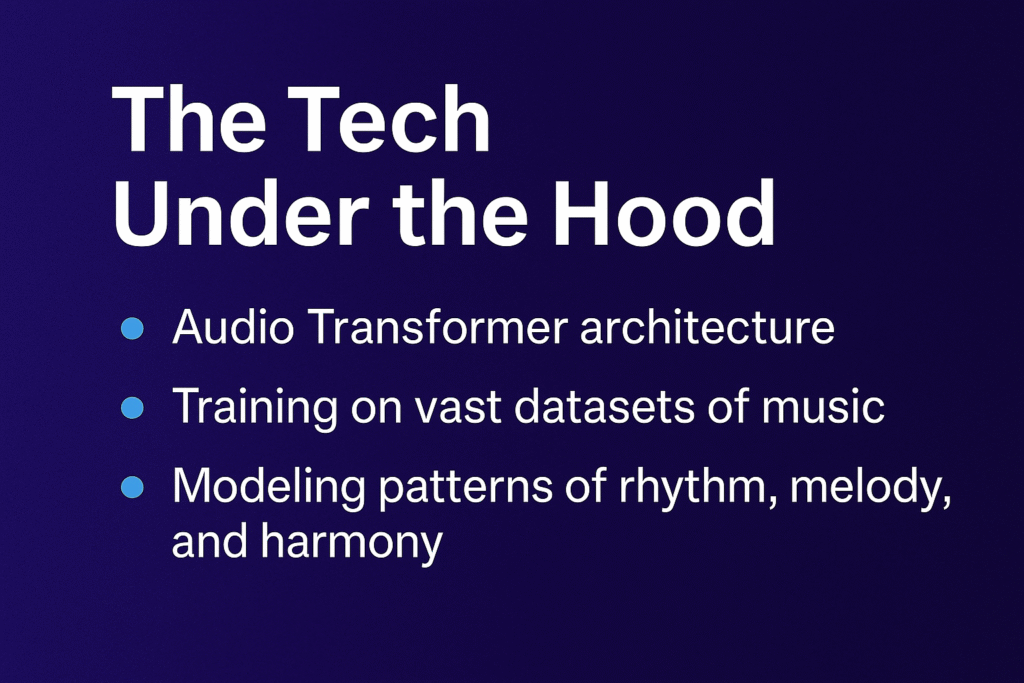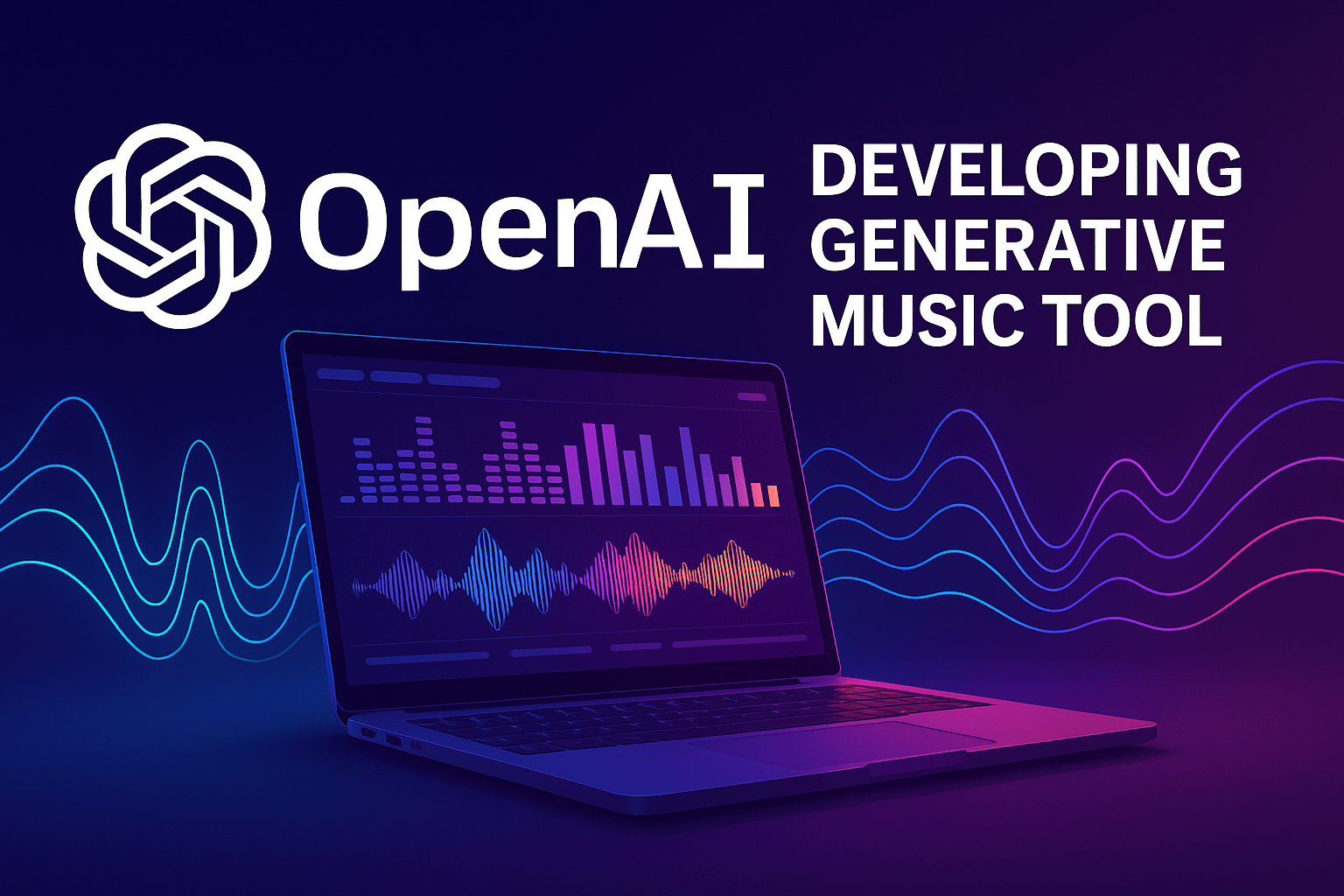A New Generative Music Tool by OpenAI, OpenAI is working on a new tool that would generate music based on text and audio prompts, according to a report in The Information.
When you hear the name OpenAI, you probably think of advanced text-based AI like chatbots, image generation, or large language models. But now, OpenAI is also developing a new music tool—a generative music system that could radically change how entrepreneurs, tech enthusiasts, musicians and creators approach music production. This post dives deep into what’s happening, why it matters, and how you can potentially get ahead of the curve.
What’s going on with OpenAI & music?
The latest move: Generative Music Tool by OpenAI
- According to multiple sources, OpenAI is quietly building a generative music tool that can create entire tracks from text or audio prompts. CryptoRank+3The Tech Buzz+3Longbridge SG+3
- The tool reportedly uses training data like sheet music and potentially music annotations — for example a partnership with students at Juilliard School has been mentioned. Longbridge SG+1
- It appears OpenAI’s purpose is to democratize music creation: enabling mediums from hobbyists to entrepreneurs to generate music faster, cheaper, and in more creative ways. thebytebeam.com+1
Why now? Market context and strategic positioning
- The generative-music space is heating up: several startups (e.g., Suno, Udio) are already working on tools that let users generate songs, loops, or music beds. The Information+1
- OpenAI has strong incentive: by adding a music creation capability they can extend usage of their ecosystem (e.g., more creative workflows), open new revenue streams, and further embed themselves in the creator economy. Longbridge SG
- For entrepreneurs and tech enthusiasts, this means the tool could become a strategic platform for creative startups: generating bespoke music, audio branding, game soundtracks, ad-beds, etc.
How the tool likely works (and what’s different this time)
The tech under the hood

- OpenAI previously released Jukebox (2020) which generated songs with vocals by training on over 1.2 million track samples. Wondershare Filmora+1
- The new generative music tool reportedly builds on improved architectures and larger/more diverse datasets (including sheet music, audio, possibly annotated scores) to enable more control and higher fidelity. Longbridge SG+1
- For example, the input prompt could be “generate a 90-second pop track in the style of synth-wave with female vocals”, or feed in a short audio clip and ask it to remix or extend. That’s what the reports suggest. The Tech Buzz+1
What sets this apart
- Accessibility: Rather than requiring deep ML knowledge or huge computing resources, the tool is likely aimed at creators of all levels.
- Prompt-based: The move from “code + training data” to “text/audio prompt + AI does the rest” is significant for usability and speed.
- Quality and control: The challenge with earlier tools (including Jukebox) was structure, coherence, and style control. The new tool aims for better realism, longer pieces, and higher usefulness to creators. NVIDIA Developer+1
- Business-ready: For entrepreneurs this means you could use it for branding, sound design, music for apps/games, social media, etc. It is not just for hobbyists.
Potential use-cases for tech enthusiasts and entrepreneurs
Here’s how you could leverage this development:
1. Audio branding & marketing
- Use the tool to generate custom theme music for your brand, YouTube channel, podcast, or social media.
- Entrepreneurs can create unique soundtracks for product launches, unmatched by generic stock music.
2. Creative startups and side-hustles
- Launch a service that offers “AI-generated music packs” for indie game developers, filmmakers, social creators.
- Offer bespoke tracks: e.g., “10 seconds of cinematic horror music”, “loopable ambient for productivity apps”.
3. Game and app development
- Integrate generative music into games: dynamic soundtracks that respond to game state or user input.
- Mobile apps that generate user-specific music on the fly (fitness apps, meditation apps, etc.).
4. Collaborations & remix culture
- Musicians and producers can use the tool to jumpstart compositions, remix existing ideas, or experiment in new genres.
- Entrepreneurs could create marketplaces where AI-generated music is licensed for creators.
Challenges and considerations
Copyright and licensing risks
- The music industry will closely watch how copyright and licensing are handled. Training on existing music datasets raises concerns. Dupple
- Issues: Who owns the generated track? Is it copyright protected? What if it closely resembles an existing track?
- For entrepreneurs: ensure you understand terms of service, licensing rights, and risk mitigation.
Quality vs. novelty tradeoffs
- While the technology is improving, generative music still faces challenges with long-term structure (e.g., choruses, verses, unpredictable transitions). Earlier models admitted this. Wondershare Filmora+1
- Real-world adoption will depend on how usable the output is for professionals (not just experiments).
Adoption & differentiation
- With the tool becoming more accessible, many creators will use it. Your differentiation might come from niche application, remix workflows, or branding strategies.
- Entrepreneurs need to think about how to monetize rather than just “generate music”.
Strategic steps you can take now on Generative Music Tool by OpenA
Here’s a practical roadmap for tech enthusiasts & entrepreneurs:
- Stay ahead of announcements
- Follow OpenAI’s blog and trusted tech news sites. Reports indicate the tool is under development now. The Information+1
- Join beta/early access lists if available.
- Brainstorm business models
- Identify niche markets: e.g., social media creators, indie game devs, short-form video producers.
- Think about pricing, licensing model, subscription vs one-time purchase.
- Prototype use-cases
- Use existing AI music tools (including older ones) to prototype workflows.
- Create sample portfolio: “AI-generated theme for X” and test user response.
- Plan for compliance & IP
- When the tool launches, review the rights/out-licencing.
- Consider adding human-in-the-loop editing to increase uniqueness & avoid risk.
- Leverage the hype in your marketing
- Create blog posts, social media content around “how to use AI music generation” to position yourself early.
- Use the keyword “OpenAI developing new music tool” (and similar long-tails) in your content.
What this means for the future of music & creativity
- Democratization of music production: Anyone with a prompt could generate a track — lowering barriers to entry.
- New creation workflows: Musicians might collaborate with AI, shifting from “instrument performance” to “prompt-engineering + editing”.
- Market disruption: Traditional music production (studios, licensing) may be challenged; new services and markets will emerge.
- Hybrid human/AI creativity: The best results may come when human expertise and AI generation combine — editing generated output, fine-tuning it.
Key takeaways for Generative Music Tool by OpenA
- OpenAI is developing a generative music tool, allowing creation of songs/tracks from text or audio prompts.
- For entrepreneurs and tech enthusiasts, this is a major opportunity: audio branding, creative services, game/app soundtracks, side-hustles.
- But proceed with caution: copyright, quality, differentiation and licensing are real challenges.
- Strategically, you can prepare now by ideating use-cases, prototyping, following the development and readying your business model.
Conclusion & Call to Action
In short: when OpenAI launches this new tool, it’s likely to shift the landscape of music production — and creative entrepreneurs are positioned to ride the wave. If you’re a tech enthusiast or entrepreneur, don’t wait: start building your knowledge, ideate business models today, and stay ready to take action when the tool becomes available.
Ready to dive in? Subscribe to relevant OpenAI updates, brainstorm how you might integrate this generative music capability into your brand or service, and draft a plan to launch early. The creative future is listening.
Meta Keywords:
OpenAI, generative music tool, AI music generation, music AI, prompt-based music, creative AI startups, music industry innovation
